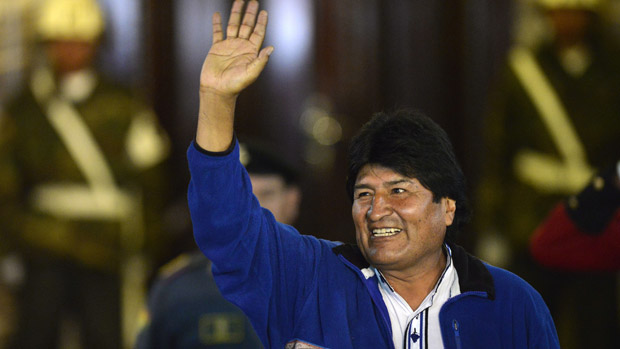Why Bolivia’s President Evo Morales is stepping down
South America’s longest serving leader faced calls to resign after audit found ‘clear manipulations’ of the voting system

A free daily email with the biggest news stories of the day – and the best features from TheWeek.com
You are now subscribed
Your newsletter sign-up was successful
Bolivia’s President Evo Morales is standing down after serious irregularities were reported at the vote last month that returned him to power for a fourth term.
The left-wing incumbent, who has led the country for almost 14 years, initally claimed victory over his rival Carlos Mesa by just over 10% following the 20 October election.
However, an audit by the Organisation of American States (OAS) found “clear manipulations” of the voting system that meant it could not verify the result.
The Week
Escape your echo chamber. Get the facts behind the news, plus analysis from multiple perspectives.

Sign up for The Week's Free Newsletters
From our morning news briefing to a weekly Good News Newsletter, get the best of The Week delivered directly to your inbox.
From our morning news briefing to a weekly Good News Newsletter, get the best of The Week delivered directly to your inbox.
There have been widespread protests across the county in the past few weeks, which Reuters says “rattled Morales, a survivor of Latin America’s leftist ‘pink tide’ two decades ago, while shaking faith in the stability of Bolivia’s democracy”.
At least three people have died in the unrest and more than 300 injured in clashes between anti-government protesters and Morales supporters since the election. In a significant development, The Guardian reports that “over the weekend... police forces joined anti-government protests, and the military said it would not ‘confront the people’ who had taken to the streets”.
Backed into a corner and fearing a coup, Morales held a televised news conference yesterday to tell assembled journalists he had decided to call fresh elections to “to preserve the new Bolivia, life and democracy”.
–––––––––––––––––––––––––––––––For a round-up of the most important stories from around the world - and a concise, refreshing and balanced take on the week’s news agenda - try The Week magazine. Get your first six issues for £6–––––––––––––––––––––––––––––––
A free daily email with the biggest news stories of the day – and the best features from TheWeek.com
South America’s longest-standing contemporary leader announced he would also replace members of the country’s election board. The body has been heavily criticised after an unexplained 24-hour halt in the vote count on 20 October, which showed a shift in favour of Morales when it resumed.
But in another televised address today, he announced his resignation, saying he was doing so to protect the families of political allies whose homes have been burned down.
He urged protesters to “stop attacking the brothers and sisters, stop burning and attacking”.
Morales claimed he had been the victim of a coup, but the OAS report said that it was “statistically improbable” that he had obtained the 10% difference to avoid a second round. The president had declared victory before the final count with just enough votes to avoid a run-off, which some polls had indicated he could lose.
“In his 14 years in power, Bolivia’s first indigenous president has won three sweeping presidential victories and changed the Bolivian constitution. But he ignored a defeat in a 2016 referendum on whether he should be allowed to seek a fourth term, angering Bolivians who feared he may have autocratic tendencies,” says the Financial Times.
BBC South America correspondent Katy Watson said many in the opposition would not have accepted Morales as a candidate, with his critics doubtful that clean elections are possible if he ran again. The head of the army had also called on him to resign.
-
 The mystery of flight MH370
The mystery of flight MH370The Explainer In 2014, the passenger plane vanished without trace. Twelve years on, a new operation is under way to find the wreckage of the doomed airliner
-
 5 royally funny cartoons about the former prince Andrew’s arrest
5 royally funny cartoons about the former prince Andrew’s arrestCartoons Artists take on falling from grace, kingly manners, and more
-
 The identical twins derailing a French murder trial
The identical twins derailing a French murder trialUnder The Radar Police are unable to tell which suspect’s DNA is on the weapon
-
 Epstein files topple law CEO, roil UK government
Epstein files topple law CEO, roil UK governmentSpeed Read Peter Mandelson, Britain’s former ambassador to the US, is caught up in the scandal
-
 Iran and US prepare to meet after skirmishes
Iran and US prepare to meet after skirmishesSpeed Read The incident comes amid heightened tensions in the Middle East
-
 Israel retrieves final hostage’s body from Gaza
Israel retrieves final hostage’s body from GazaSpeed Read The 24-year-old police officer was killed during the initial Hamas attack
-
 China’s Xi targets top general in growing purge
China’s Xi targets top general in growing purgeSpeed Read Zhang Youxia is being investigated over ‘grave violations’ of the law
-
 Panama and Canada are negotiating over a crucial copper mine
Panama and Canada are negotiating over a crucial copper mineIn the Spotlight Panama is set to make a final decision on the mine this summer
-
 Why Greenland’s natural resources are nearly impossible to mine
Why Greenland’s natural resources are nearly impossible to mineThe Explainer The country’s natural landscape makes the task extremely difficult
-
 Iran cuts internet as protests escalate
Iran cuts internet as protests escalateSpeed Reada Government buildings across the country have been set on fire
-
 US nabs ‘shadow’ tanker claimed by Russia
US nabs ‘shadow’ tanker claimed by RussiaSpeed Read The ship was one of two vessels seized by the US military